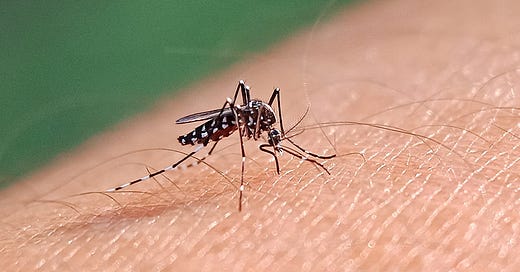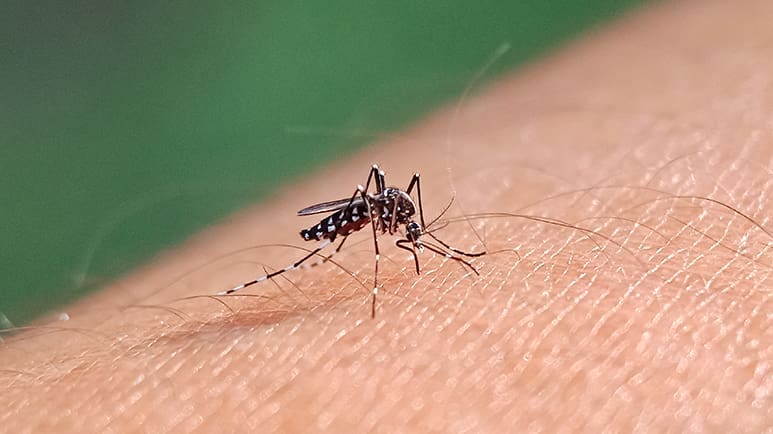Simple Steps to Shield Yourself from Mosquito-Borne Threats
Discover nature's powerful shield against disease-carrying mosquitoes. Learn how simple steps and plant-based solutions can protect you and your family from these tiny but dangerous pests.
STORY AT-A-GLANCE
Mosquito-borne diseases affect 80% of the world's population, causing over 700,000 deaths annually. In the U.S., 12 mosquito species can spread diseases like West Nile virus, dengue and Eastern equine encephalitis
Female mosquitoes inject saliva containing pathogens when they bite, but it takes two to three weeks for these pathogens to become infectious, emphasizing the importance of consistent prevention methods
Essential oils from plants like Lantana camara and Schinus terebinthifolia show exceptional mosquito-repelling properties, rivaling DEET's effectiveness without the toxic side effects
Citrus macroptera and Homalomena aromatica oils provide five to six hours of protection against Aedes aegypti mosquitoes, with their effectiveness linked to compounds like linalool and limonene
Environmental management, including removing standing water, planting mosquito-repelling plants, and inviting natural predators like bats, creates an inhospitable environment for mosquitoes around your property
Mosquito-borne diseases pose a significant risk to public health, affecting nearly 80% of the world's population.1 These tiny insects are responsible for spreading viruses and parasites that cause diseases like dengue fever, yellow fever, chikungunya and malaria.
According to the World Health Organization, vector-borne diseases account for more than 17% of all infectious diseases and cause over 700,000 deaths annually.2 The situation has worsened in recent years due to rapid urbanization and population growth, making natural strategies for protection increasingly important.
Mosquito Dangers Lurking in Your Backyard
In the U.S. alone, over 200 types of mosquitoes buzz around, with about 12 species capable of spreading diseases that can make you sick.3 While most mosquitoes are merely a nuisance, it's important to understand the potential threats they carry. The U.S. Centers for Disease Control and Prevention (CDC) warns that you can't tell if a mosquito is infected just by looking at it, which is why protection against all bites is essential.
The most common disease-carrying mosquitoes in the U.S. belong to the Aedes, Culex and Anopheles species.4 These seemingly harmless insects can transmit a variety of viruses and parasites, turning your backyard into a potential health hazard.
It's not just about comfort; it's about safeguarding your health and that of your loved ones. By understanding the risks, you'll be better equipped to take proactive measures to protect yourself and your family from these silent threats.
West Nile Virus and Other Mosquito-Borne Threats
Among the mosquito-borne diseases in the continental U.S., West Nile virus stands out as one of the most prevalent. Transmitted primarily by Culex species mosquitoes, this virus has established itself as a persistent threat across the U.S. What makes West Nile particularly worrisome is its ability to cause severe neurological complications in some cases.
Dengue, chikungunya and Zika viruses have also caused outbreaks in U.S. states and territories, including Florida, Hawaii, Texas, Puerto Rico, the U.S. Virgin Islands and American Samoa. These diseases, primarily spread by Aedes species mosquitoes, cause a range of symptoms from mild fever to severe joint pain.
While less common than some other mosquito-borne diseases, Eastern equine encephalitis5 deserves your attention due to its potential severity. This rare but deadly virus, transmitted primarily by Culiseta melanura mosquitoes, causes inflammation of the brain that can be fatal.
The Insidious Process of Mosquito Disease Transmission
Understanding how mosquitoes transmit diseases can help you appreciate why prevention is so crucial. It's not as simple as a mosquito biting an infected person and then immediately spreading the disease. The process is more complex and insidious. When a female mosquito takes a blood meal from an infected host, it ingests the pathogen — be it a virus or parasite.
But here's the key: the germ must then survive and multiply within the mosquito's body. This process, called the extrinsic incubation period, typically takes two to three weeks. During this time, the pathogen moves from the mosquito's gut to its salivary glands. Only then, when the mosquito bites again, can it transmit the disease through its saliva.
This delay is why mosquito control efforts often focus on eliminating adult mosquitoes that have had time to become infectious. It's also why your vigilance in preventing bites should be constant, as you never know which mosquitoes have completed this incubation period.
Female mosquitoes seek out human blood specifically for reproduction. The proteins and nutrients in your blood are essential for them to produce eggs. These tiny vampires are equipped with a specialized tool called a proboscis — think of it as a natural, ultra-fine hypodermic needle. When a female mosquito lands on your skin, she uses this proboscis to pierce through and navigate until she locates a capillary.
Once she's tapped into your blood supply, she doesn't just take — she gives something in return, though it's far from a fair trade. The mosquito injects her saliva, which contains anticoagulants to keep your blood flowing freely. However, this saliva is also the vehicle for disease transmission, introducing pathogens directly into your bloodstream. As she feeds, your blood fills her abdomen, where it's digested and used to fuel egg production.
Nature's Shield: Plant Oils That Keep Mosquitoes at Bay
Consistent, natural mosquito prevention methods are your best defense against these disease-carrying invaders. A study published in the journal Molecules unveiled the ability of certain plant essential oils to effectively repel mosquitoes, offering a natural alternative to synthetic products.6
Researchers examined oils from five aromatic plants: Lantana camara, Schinus terebinthifolia, Callistemon viminalis, Helichrysum odoratissimum and Hyptis suaveolens. These were tested against three mosquito species known for spreading diseases like dengue, malaria and West Nile virus.
The standout performers? Lantana camara and Schinus terebinthifolia (Brazillian pepper) oils showed exceptional repellent properties, rivaling the effectiveness of DEET, the toxic synthetic repellent.7
Interestingly, different mosquito species reacted differently to the oils, with Culex quinquefasciatus (a carrier of West Nile virus) being the most susceptible to the repellents, followed by Aedes aegypti (dengue vector), while Anopheles gambiae (malaria vector) showed more resistance.
The Science Behind the Scent
You might wonder what makes these plant oils so effective against mosquitoes. The secret lies in their complex chemical composition. For instance, the Lantana camara oil, which showed the highest repellency, contains a mix of compounds including trans-β-caryophyllene, sabinene and 1,8-cineole. These components work together to create a potent mosquito deterrent.
The Schinus terebinthifolia oil, another top performer, boasts a blend of α-pinene, limonene and α-phellandrene. These natural chemicals likely interfere with the mosquitoes' sensory receptors, making it difficult for them to locate their human targets. What's particularly exciting is the longevity of the repellent effect. In some cases, the oils provided protection for up to 180 minutes at higher concentrations.
This extended protection period rivals that of many commercial repellents, suggesting that these natural alternatives are just as practical for everyday use. Moreover, the study found that these oils not only repel adult mosquitoes but also deter females from laying eggs in treated water sources, breaking the mosquito life cycle at multiple points.8
While the study used pure essential oils, it's important to note that these should be properly diluted before application to the skin. You might consider looking for natural repellent products that incorporate these oils, or work with a qualified aromatherapist to create a safe, effective blend.
Beyond personal use, these findings open up exciting possibilities for wider mosquito control strategies, like mosquito traps infused with these natural repellents or public spaces protected by the subtle scent of these plants.
More Traditional Essential Oils as Mosquito Repellents
Another study uncovered the potential of two plants, Citrus macroptera (locally known as Hatkora) and Homalomena aromatica (known as Anchiri), as effective mosquito repellents.9
These plants have been used traditionally by the inhabitants of Mizoram state in India, and now science is backing up their ancestral wisdom. The essential oils extracted from the fruit peel of C. macroptera and the rhizomes of H. aromatica have shown promising results against Aedes aegypti mosquitoes.
The study revealed that H. aromatica oil provided protection for up to 6.16 hours, while C. macroptera oil lasted for 5.16 hours. Compare this to the commonly used DEET, which offers about eight hours of protection.
When these two oils were combined in a 1:1 ratio, they provided protection for 6.33 hours. This natural blend not only repels mosquitoes effectively but also comes with additional benefits, thanks to the presence of limonene, which has antioxidant, anti-inflammatory and neuroprotective properties.
The major components found in both oils are linalool, limonene, terpinen-4-ol and α-terpineol. These compounds interact with the odorant-binding proteins of mosquitoes, essentially confusing their sensory system and making it harder for them to locate you as a potential meal. The researchers conducted molecular docking studies to understand this interaction better.
They found that linalool, which is present in high quantities in H. aromatica oil, had the highest binding energy against the mosquito's odorant-binding protein. This explains why H. aromatica oil showed longer-lasting repellent activity. While limonene had the lowest binding energy, its presence in the oil mixture provides a pleasant scent and additional health benefits, making the blend more appealing for regular use.10
The Power of Environmental Management
One of the most effective ways to shield yourself from mosquito-borne threats is through environmental management. This approach focuses on eliminating mosquito breeding sites and creating an inhospitable environment for these pests. Start by removing standing water around your property, as this is where mosquitoes lay their eggs.
Regularly empty and clean birdbaths, pet water bowls and any containers that collect rainwater. Ensure your gutters are clear and properly draining to prevent water accumulation. Maintain your lawn and garden by keeping grass short and removing excess vegetation where mosquitoes might rest. Consider planting mosquito-repelling plants like citronella grass, marigolds or lavender around your outdoor living areas.
These natural deterrents help create a mosquito-free zone without the use of chemical sprays. You can also install or repair screens on windows and doors to keep mosquitoes out of your home.
In addition, wear light-colored, loose-fitting long sleeves and pants when you're outdoors, especially during dawn and dusk when mosquitoes are most active. These simple clothing choices significantly reduce the amount of exposed skin for mosquitoes to target.
You can also invite nature's mosquito control experts to your yard. Bats are voracious mosquito eaters, capable of consuming up to 1,000 mosquitoes in a single hour.11 Install bat houses in your yard to provide these beneficial creatures with a home. Not only will you be reducing the mosquito population, but you'll also be supporting local wildlife.
Remember, conventional mosquito repellents often contain DEET, a chemical that I've long warned about due to its potential neurotoxic effects. Instead, try natural alternatives like citronella, lemon eucalyptus oil or neem oil. These plant-based repellents are highly effective when used correctly. By embracing these natural methods, you're not only protecting yourself but also contributing to the overall reduction of mosquito populations in your community.
Disclaimer: The entire contents of this website are based upon the opinions of Dr. Mercola, unless otherwise noted. Individual articles are based upon the opinions of the respective author, who retains copyright as marked.
The information on this website is not intended to replace a one-on-one relationship with a qualified health care professional and is not intended as medical advice. It is intended as a sharing of knowledge and information from the research and experience of Dr. Mercola and his community. Dr. Mercola encourages you to make your own health care decisions based upon your research and in partnership with a qualified health care professional. The subscription fee being requested is for access to the articles and information posted on this site, and is not being paid for any individual medical advice.
If you are pregnant, nursing, taking medication, or have a medical condition, consult your health care professional before using products based on this content.






The W.H.O? No thanks.